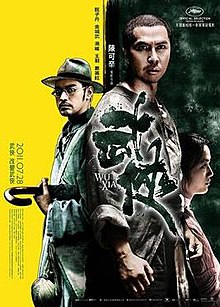 Last night I had the privilege of watching a great movie, named "Wu Xia" (but renamed for westerners as "Dragon" - see the IMDB listing here). Why the translation as Dragon (which is mandarin is "Long")?
Last night I had the privilege of watching a great movie, named "Wu Xia" (but renamed for westerners as "Dragon" - see the IMDB listing here). Why the translation as Dragon (which is mandarin is "Long")?
The generally accepted literal translation is "martial" (Wu) "hero" (Xia) - a martial arts hero. This latter word gets bandied about a lot in Chinese martial arts circles, including by my teacher ("woman is the enemy of the hero"). Women of course are a distraction from the long, arduous training that is required to attain superior levels of skill.
But heroes are supposed to be good guys, defending the weak, upholding justice, and so on. But in this movie, winner of many awards, the protagonist is both "hero" and "villain". He was an exceedingly nasty evil bandit, member of the "72 demons" gang of bloodthirsty criminals, but reforms and decides to become a nice smiling family man. In both cases, but notably in the former role, he was an extremely high level martial artist.
So this concept of "Wu Xia" is not quite the same as the western translation. Heroes are not always good. "The water margin", one of the four classic works of Chinese literature, is the story of 108 heroes not all of whom are always engaged in heroic deeds. Perhaps, we should just accept that a hero does not have to be a nice guy, and that it is the end which counts, rather than the means.
In the film I saw last night, the protagonist clearly undergoes a transformation and arguably rights the wrongs he inflicted in his previous role.
See the wikipedia article here for a longer discussion about the meaning of Wu Xia. Most importantly, don't get distracted from your training!